Middle East
Canelo Alvarez vs William Scull: Fight start time, undercard, stream, purse | Boxing News
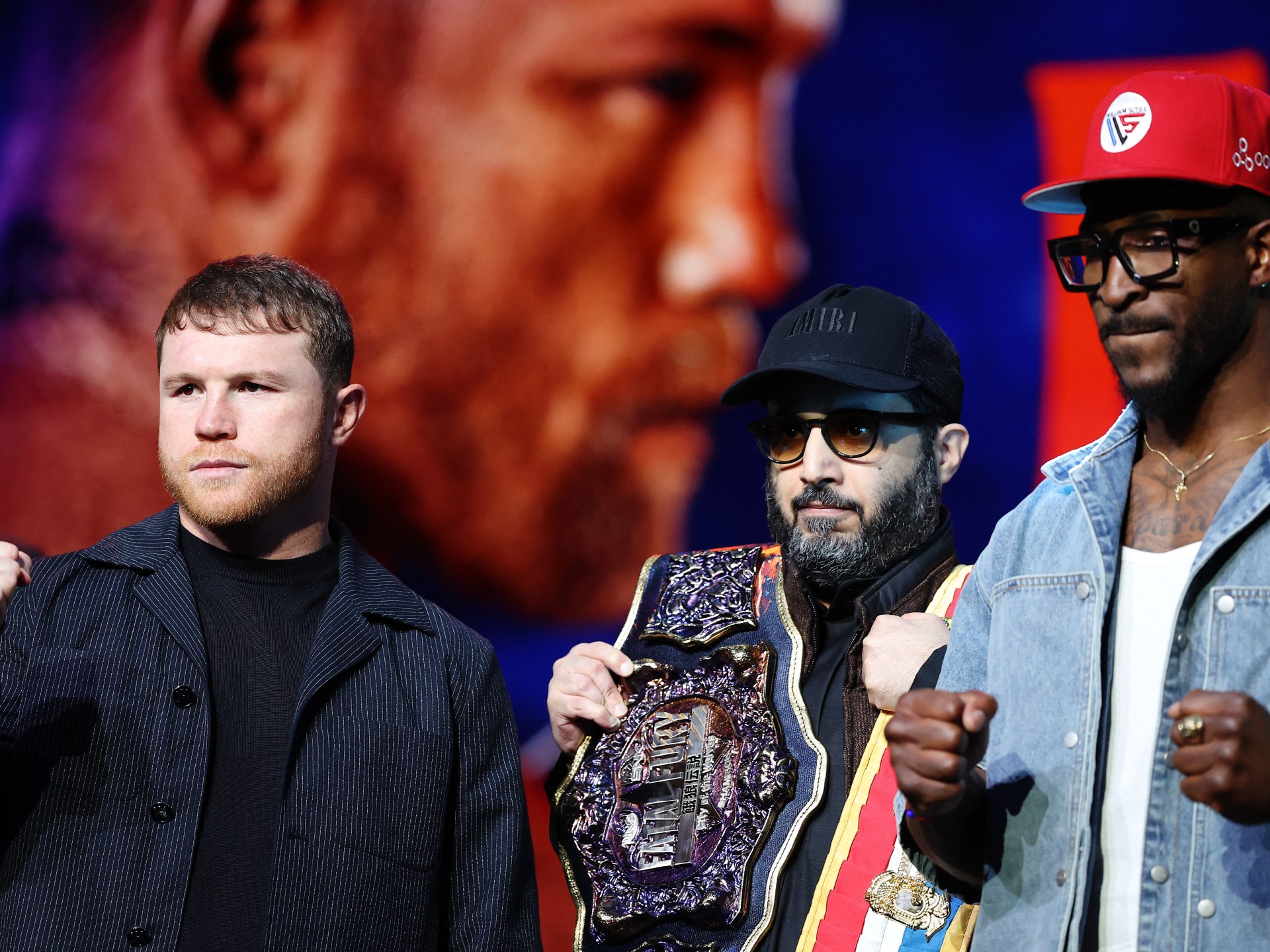
Saul “Canelo” Alvarez, one of the most popular and highest-paid athletes, is set to face an unbeaten challenger, William Scull, in a highly anticipated boxing fight that will crown the men’s undisputed super middleweight champion of the world.
The bout will take Alvarez to Saudi Arabia for the first time as part of his deal with Riyadh Season and will present him with a chance to regain his IBF belt.
Here’s what you need to know about the fight:
When is the Alvarez vs Scull fight?
The fight is scheduled for Saturday, May 3.
Where is the Alvarez vs Scull fight taking place?
The ANB Arena in Riyadh, Saudi Arabia, will host the fight.
What’s the Alvarez vs Scull fight start time?
The pre-fight events, followed by the undercard fights, will get under way at 18:00 GMT.
Ring walks for the main fight are not expected to begin before 22:00 GMT.
How can I follow and stream the Alvarez vs Scull fight live?
Al Jazeera Sport’s live coverage of the pre-fight build-up and undercard results will begin at 17:00 GMT, followed by a comprehensive text and photo blow-by-blow account of the main fight at 22:00 GMT.
The fight will be streamed live on DAZN pay-per-view.
Who is on the undercard?
The fight night, titled “Fatal Fury”, boasts a strong undercard with a rematch between Bruno Surace and Jaime Munguia the pick of the fights.
Marco Verde, Mexico’s silver medallist at the Paris Olympics 2024, will also make his professional debut on the night with his light middleweight fight against compatriot Michel Polina.
Here’s what the undercard looks like:
Jaime Munguia vs Bruno Surace – super middleweight
Martin Bakole vs Efe Ajagba – heavyweight
Badou Jack vs Norair Mikaeljan – cruiserweight
Marco Verde vs Michel Polina – light middleweight
Brayan Leon vs Aaron Guerrero – middleweight

What is the fight purse?
While the official fight purse has not been announced, Canelo is set to earn $80m from the fight, according to Spanish sports newspaper Marca.
Who is Canelo Alvarez?
One of the most famous fighters of the current era, Alvarez is a professional boxer from Guadalajara, Mexico. Better known as simply Canelo, the 34-year-old began fighting, aged 15, in 2005 and turned pro five years later. Coming from a rural background, the Mexican has built a reputation as one of the world’s best boxers, with a worth of $275m, according to Forbes magazine.
Alvarez has fought in multiple weight classes – from welterweight to light heavyweight – and has held belts in four of these divisions.
At a height of 1.75 metres, an orthodox stance and a reach of 70.5 inches, Alvarez has pummelled many famous opponents in his 15-year professional career.
He’s currently the world’s top-ranked super middleweight boxer and in possession of the World Boxing Association (WBA), World Boxing Council (WBC) and World Boxing Organisation (WBO) belts.
In his last professional fight in September 2024, Alvarez beat challenger Edgar Berlanga by a unanimous points decision in three rounds.

Who is William Scull?
Born in Matanzas, Cuba, Scull turned professional at the age of 24 and enjoys an unbeaten record in his pro career.
The 32-year-old became the International Boxing Federation’s super middleweight champion in 2024 when Alvarez relinquished his belt.
Scull fights with an orthodox stance and with a reach of 73 inches, the Cuban is a formidable figure in the ring.
His last fight, against Vladimir Shishkin, in October 2024, earned him the vacant IBF super middleweight belt.

Which boxing belts are Canelo Alvarez and William Scull fighting for?
The fight is set to unify the WBC, WBA and WBO super middleweight titles held by Alvarez with Scull’s IBF belt, which was relinquished by Alvarez.
What’s Alvarez’s fight record?
Fights: 66
Wins: 62
Wins by knockout: 39
Losses: 2
Draws: 2
What’s Scull’s fight record?
Fights: 23
Wins: 23
Wins by knockout: 9
Losses: 0
Draws: 0
What has Canelo Alvarez said about the fight?
The fighters have exchanged indirect words on what to expect from the bout on Saturday, with Alvarez dismissing Scull’s claims of eating the Mexican.
“He’s going to eat punches, that’s what he’s going to eat,” Alvarez told iFL TV on Wednesday.
The famous boxer has previously said he will treat the bout with importance, as it presents him with the opportunity to fight in a different country.
“That motivates myself – fighting in another country. I feel great about it. This fight is very important to me. I never take anything easy.”
What has Scull said about the fight?
Meanwhile, Scull has said he doesn’t want to be disrespectful towards his opponent but will “eat him” in the ring.
“I’m here to win and that’s it,” the challenger said on Tuesday.
“I’m going to eat him. Now, I’m focused on what I have to do. I’m very excited because I’m here to shut some mouths and do what I have to do.”
Why did Alvarez pull out of his fight with Jake Paul?
When the Mexican boxing icon passed up a speculated bout with the YouTube personality and boxer Jake Paul in favour of a deal with Riyadh Season in February, Paul termed him “a money-hungry squirrel” chasing his “next nut”.
Alvarez signed a four-fight deal with Riyadh Season, with his upcoming bout against Scull being the first one.
Alvarez would have been an astronomical favourite to beat Paul, who beat Mike Tyson in November 2024.
Middle East
Palestine the world’s most dangerous place for journalists, RSF says | Israel-Palestine conflict News

US President Donald Trump overseeing ‘troubling deterioration’ in press freedom in US, Reporters Without Borders says.
Palestine has become the world’s most dangerous state for journalists amid Israel’s war on Gaza, with dozens of reporters likely killed specifically due to their work, a media freedom watchdog has said.
Israeli forces killed nearly 200 journalists in the first 18 months of the war, at least 42 of whom were slain while doing their job, Reporters Without Borders said on Friday as it released its World Press Freedom Index 2025.
“Trapped in the enclave, journalists in Gaza have no shelter and lack everything, including food and water,” said the Paris-based group, which is also known by its French acronym RSF.
“In the West Bank, journalists are routinely harassed and attacked by both settlers and Israeli forces, but repression reached new heights with a wave of arrests after 7 October, when impunity for crimes committed against journalists became a new rule.”
Journalists suspected of collaborating with Israel are also hampered in their work by Hamas and the Islamic Jihad, while a cybercrime law adopted by the Palestinian Authority limits freedom of expression and freedom of the press, RSF said in its report.
Palestine ranked 163rd for press freedom in the latest index, a drop of six places from 2024.
Of 180 jurisdictions, 112 saw declines in press freedom, with the average score globally falling to a record low of 55 points, according to the report.
The United States dropped two places to a record low of 57, with the watchdog accusing US President Donald Trump of overseeing a “troubling deterioration in press freedom”.
“President Donald Trump was elected to a second term after a campaign in which he denigrated the press on a daily basis and made explicit threats to weaponize the federal government against the media,” RSF said.
“His early moves in his second mandate to politicise the Federal Communications Commission (FCC), ban The Associated Press from the White House, or dismantle the US Agency for Global Media, for example, have jeopardised the country’s news outlets and indicate that he intends to follow through on his threats, setting up a potential crisis for American journalism.”
Israel dropped 11 places to 112th, with Reporters Without Borders pointing to growing restrictions on press freedom, media plurality and editorial independence since the start of the war in Gaza.
“Since 2021, only journalists working for Channel 14, a media outlet that covers Prime Minister Benjamin Netanyahu in a favourable light, have been granted interviews with the country’s leader, who accuses the Israeli press of conspiring against him,” the group said.
“In 2024, the Minister of Communication called on the government to boycott Haaretz, one of the few newspapers to criticise Netanyahu’s policies, including the massacre of civilians in Gaza – a topic that is largely suppressed.”
Eritrea was the lowest-ranked jurisdiction, just behind North Korea and China.
Norway was ranked first for press freedom, followed by Estonia, the Netherlands and Sweden.
Middle East
Syrian Druze leader condemns government over sectarian violence | News
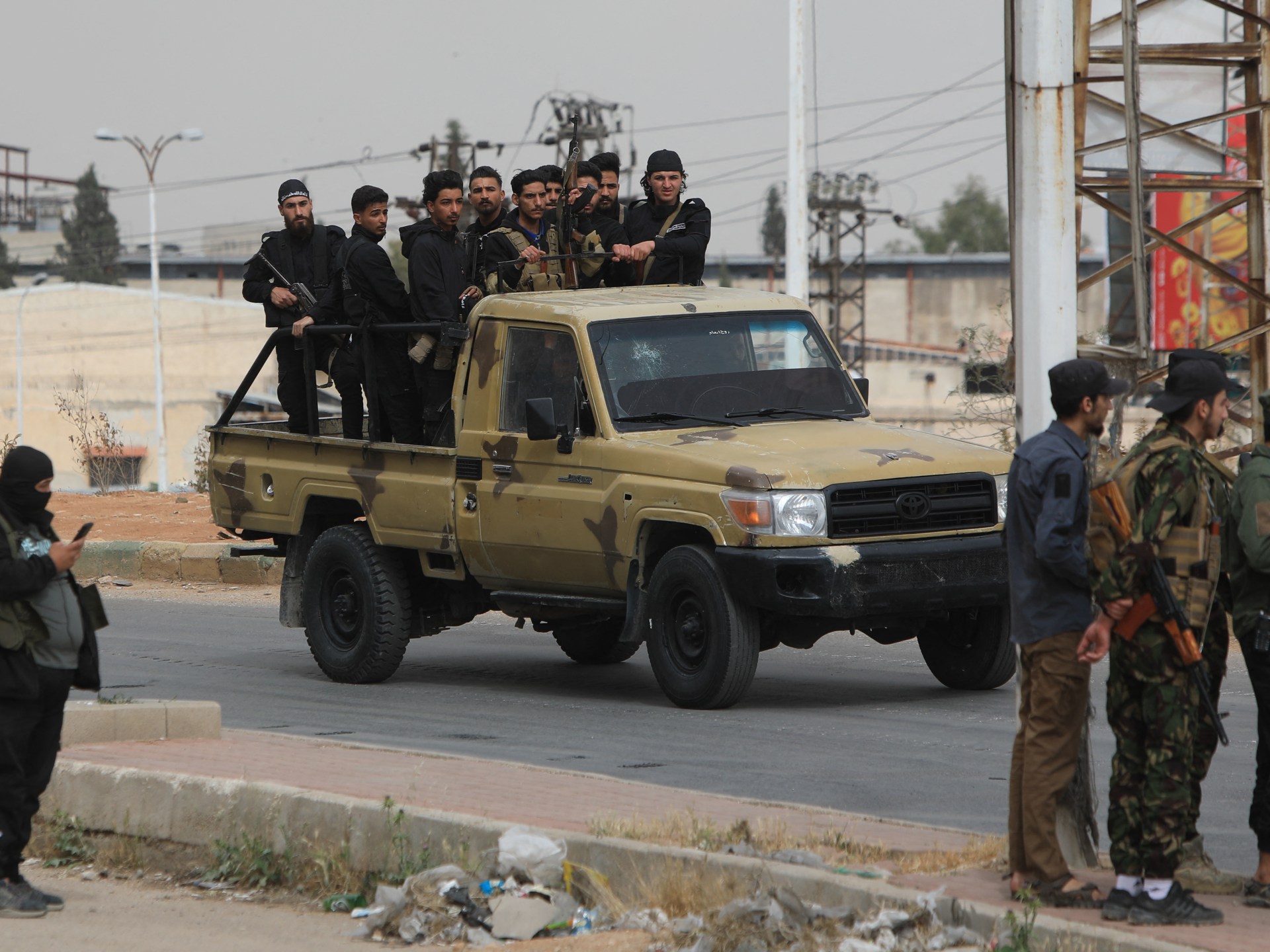
Syrian Druze leader condemns ‘genocidal campaign’ after dozens killed in clashes south of Damascus.
A leader of Syria’s Druze minority has condemned attacks against his community after dozens of people were killed in two days of sectarian clashes south of Damascus.
Sheikh Hikmat al-Hijri on Thursday denounced the violence in Jaramana and Sahnaya near Damascus earlier this week as a “genocidal campaign” against the Druze community in Syria.
Syria’s Ministry of Information said 11 members of the country’s security forces were killed in two separate attacks.
The United Kingdom-based Syrian Observatory for Human Rights (SOHR), a war monitor, said at least 101 people were killed in fighting between security forces, allied fighters and local Druze groups.
The SOHR, which relies on a network of sources in Syria, said the death toll included 30 government loyalists, 21 Druze fighters and 10 civilians, including Sahnaya’s former mayor, Husam Warwar.
In the southern province of Sweida, heartland of the Druze minority, it said 40 Druze fighters were killed, 35 in an “ambush” on the Sweida-Damascus road on Wednesday.
The clashes broke out around midnight Monday after an audio clip circulated on social media of a man criticising Islam’s Prophet Muhammad. The audio was attributed to a Druze scholar. But the scholar, Marwan Kiwan, said in a video posted on social media that he was not responsible for the audio, which angered many Sunni Muslims.
On Wednesday afternoon, the Syrian government said a deal was reached between Druze dignitaries and official representatives after which security forces and pro-government fighters entered Sahnaya and Druze gunmen withdrew from the streets.
Videos on social media showed what appeared to be pro-government armed groups beating Druze men they had captured in Sahnaya and making offensive sectarian remarks.
“This collective killing is systematic, clear, visible, and documented,” read al-Hijri’s statement. “We no longer trust a group that calls itself a government, because the government doesn’t kill its own people through extremist gangs that are loyal to it, and after the massacre claims they are loose forces.”
The violence poses a serious challenge to the country’s new authorities, who toppled longtime ruler Bashar al-Assad in December. It comes after a wave of massacres in March in Syria’s Alawite heartland on the Mediterranean coast in which security forces and allied groups killed more than 1,700 civilians, mostly Alawite, according to the SOHR.
Syrian authorities reject foreign intervention
Israeli officials have expressed support for the Druze, with Defence Minister Israel Katz warning his country would respond “with significant force” if Syria’s new authorities fail to protect the minority community.
In a later statement, Katz said, “Should the attacks on the Druze resume and the Syrian regime fail to prevent them, Israel will respond with significant force.”
Foreign Minister Asaad al-Shaibani on Thursday reiterated Syria’s rejection of demands for international intervention, posting on X that “national unity is the solid foundation for any process of stability or revival”.
“Any call for external intervention, under any pretext or slogan, only leads to further deterioration and division,” he added.
Most Druze spiritual leaders and factions have opted to air their grievances in closed communication with the new government, but concerns have heightened after a crackdown on al-Assad loyalists in Syria’s coastal province turned into a series of targeted revenge attacks against the Alawite minority group.
Videos widely circulated of houses burned down and bloodied bodies of Alawite on the streets. Tens of thousands of Alawite fled south to neighbouring Lebanon, and many are too scared to return.
The Druze have since become reluctant to lay down their arms, which they say they need for protection.
Middle East
Why are relations between Algeria and France so bad? | Politics News
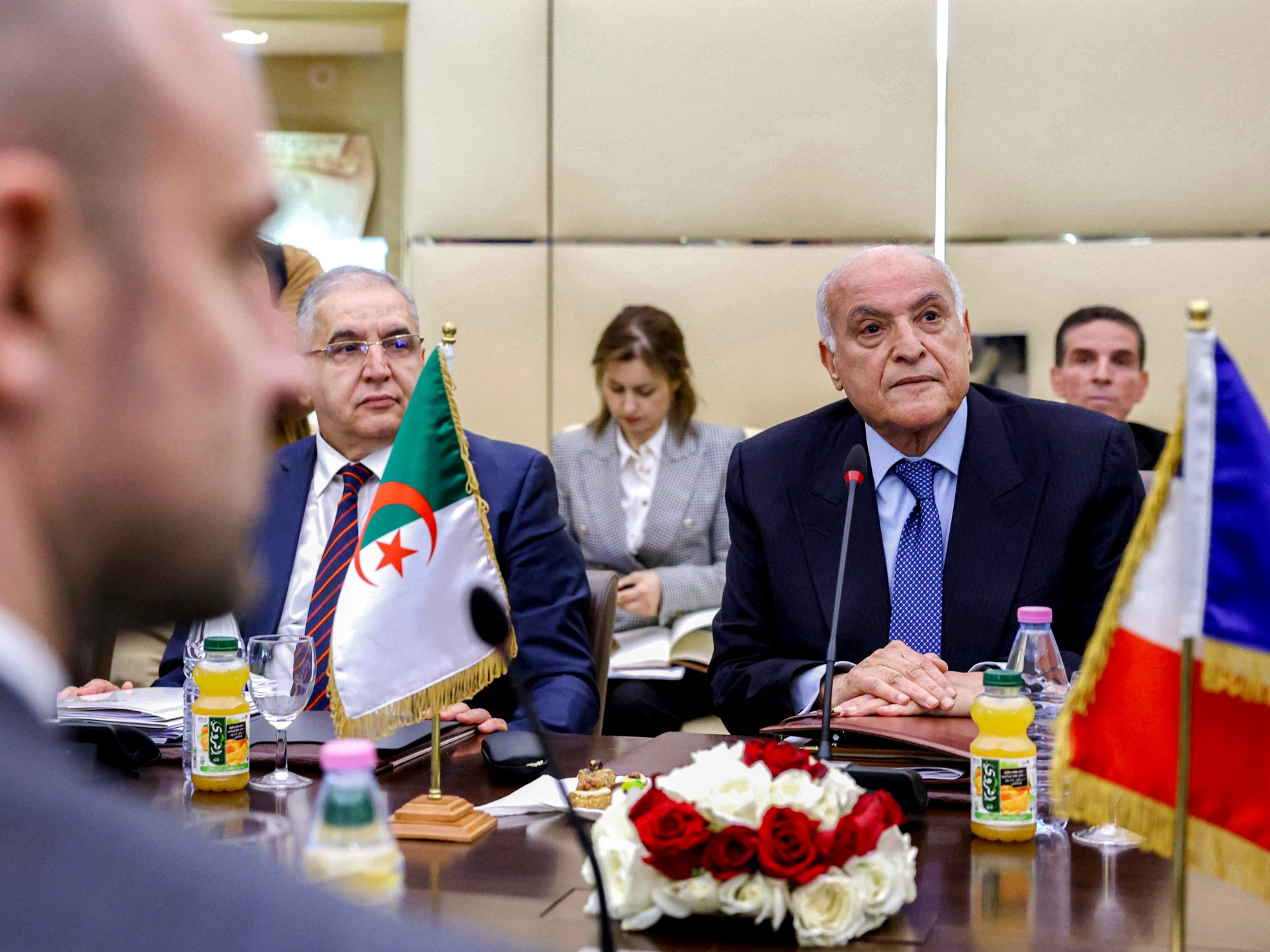
Relations between Algeria and its former coloniser, France, have rarely been straightforward.
After hitting a low point in July when France supported Algeria’s regional rival Morocco over its claim to the disputed territory of the Western Sahara, relations appeared to be recovering.
But then the April arrest in France of an Algerian consular official along with two other men for alleged involvement in the kidnapping near Paris of Algerian government critic Amir Boukhors has triggered a new wave of tensions.
So why are diplomats now being expelled, and what does this mean for relations between Algeria and its former coloniser?
Let’s break it down:
Who is Amir Boukhors?
Boukhors, or Amir DZ, is an Algerian online influencer and critic of Algerian President Abdelmadjid Tebboune with more than 1 million subscribers on TikTok.
The French government gave Boukhors political asylum in 2023.
But as far as the Algerian government is concerned, he’s a fraudster and a “terrorist”, who they’ve been seeking to extradite from France since 2016.
Algeria has tried to extradite Boukhors nine times. All attempts have been declined by France.
Why would an Algerian consular official allegedly want to kidnap him?
Speaking to the newspaper Le Parisien in an interview published on April 9, Boukhors said that on returning to his home in Val-de-Marne near Paris during the evening of April 29, 2024, he was stopped by an unmarked car with flashing lights.
Four men in civilian clothes handcuffed him and threw him into the vehicle.
“They first told me that an Algerian official wanted to talk to me, that that was why they were taking me. Then they told me the plan had changed and that I was going to Amsterdam,” Boukhors told the newspaper.
Boukhors said he was then forced to swallow sleeping pills and was held in a “container” for more than 27 hours before being released without explanation.
A subsequent investigation by France’s counterespionage agency uncovered information leading to the arrest on April 11 of three men with a fourth still reportedly at large.

No information has been released about two of the men. However, the third was an Algerian consular employee, French officials said.
Algeria issued a statement the following day strongly denying its official’s involvement and protesting the person’s arrest “in public … without notification through the diplomatic channels”.
The statement denounced what it charged was a “far-fetched argument” based “on the sole fact that the accused consular officer’s mobile phone was allegedly located around the home” of Boukhors.
All three suspects were later charged with “kidnapping or arbitrary detention … in connection with a terrorist undertaking”.
What was the diplomatic response?
On April 14, Algeria announced that 12 French consular officials had 48 hours to leave the country.
The statement, read on public television, confirmed the expulsions had been ordered in response to France’s arrest of the Algerian official.
According to the statement, the arrest had been intended to “humiliate Algeria, with no consideration for the consular status of this agent, disregarding all diplomatic customs and practices”.
France responded in kind the following day, expelling 12 Algerian consular officials from its territory and recalling its ambassador from Algiers.
A statement from the office of French President Emmanuel Macron described the Algerian decision as “incomprehensible and unjustified” and said Algiers should “resume dialogue” and “take responsibility for the degradation in bilateral relations”.
Why have relations between France and Algeria historically been poor?
France colonised Algeria for 132 years, killing Algerian civilians and creating a class structure in which European settlers and their descendants were on top.
The French refused to leave Algeria, considering it an integral part of France. It was only after a war of independence that France finally left in 1962. Algeria is still referred to as the “country of a million martyrs” because of the number of people killed by France during the fight for independence.
But the dispute has not ended there. The issue of the Western Sahara is also causing tension, not just between France and Algeria but also across North Africa.
Western Sahara – a disputed territory in northwestern Africa – is at the centre of the poor relations between Algeria and Morocco. Rabat claims the territory as its own and occupies the majority of it while Algeria supports the pro-independence Polisario Front and has taken in tens of thousands of Sahrawi refugees.
What has France’s position on the Western Sahara been?
France has largely backed Morocco – despite the United Nations not recognising Rabat’s sovereignty over the Western Sahara. And last year, Macron said France’s position was that it supported Moroccan sovereignty over Western Sahara.
At the time, Algeria voiced its “deep disapproval” of France’s “unexpected, ill-timed and counterproductive” decision to endorse Morocco’s autonomy plan for Western Sahara and recalled its ambassador.
However, relations between the two were thought to be improving since then.
Speaking in early April after a series of talks intended to restore relations after the rift, French Foreign Minister Jean-Noel Barrot said: “We are reactivating as of today all the mechanisms of cooperation in all sectors. We are going back to normal and to repeat the words of President Tebboune: ‘The curtain is lifted.’”
But the Boukhors case and the diplomatic expulsions that have followed it have made it clear that the curtain has fallen right back down.
-

 Europe2 days ago
Europe2 days agoA 400-year-old tea and coffee shop faces closure in Amsterdam as tourism stokes price rises
-

 Africa2 days ago
Africa2 days agoAlgeria to unveil military mobilisation bill amid regional tensions
-
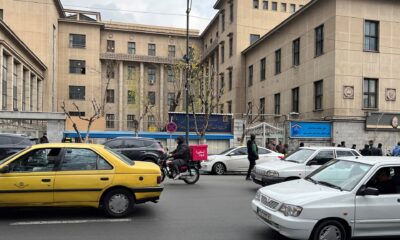
 Middle East2 days ago
Middle East2 days agoIran hangs man convicted of spying for Israel’s Mossad | Espionage News
-
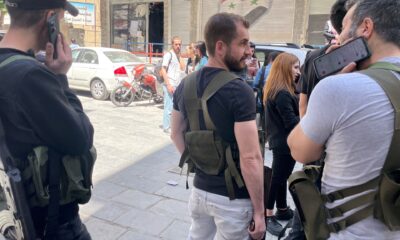
 Middle East1 day ago
Middle East1 day agoSyria says it rejects ‘foreign intervention’ after Israeli strikes | News
-
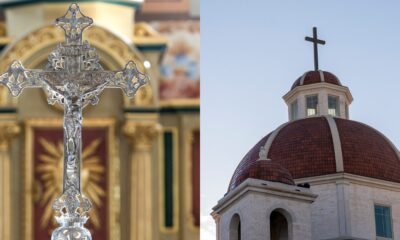
 Education2 days ago
Education2 days agoSupreme Court considers endorsing country’s first religious public charter school
-

 Middle East2 days ago
Middle East2 days agoUK joins US air strikes on Houthi rebel sites in Yemen | Houthis News
-

 Conflict Zones2 days ago
Conflict Zones2 days ago‘Exiled’: India-Pakistan families split as border shuts over Kashmir attack | India-Pakistan Partition
-

 Europe2 days ago
Europe2 days agoYouras Ziankovich: American detained in Belarus is freed, US official says




